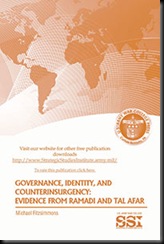Brief Synopsis
View the Executive SummaryThe premise of most Western thinking on counterinsurgency is that success depends on establishing a perception of legitimacy among local populations. The path to legitimacy is often seen as the improvement of governance in the form of effective and efficient administration of government and public services. However, good governance is not the only possible basis for claims to legitimacy. The author considers whether, in insurgencies where ethno-religious identities are salient, claims to legitimacy may rest more on the identity of who governs, rather than on how whoever governs governs. This monograph presents an analytic framework for examining these issues and then applies that framework to two detailed local case studies of American counterinsurgency operations in Iraq: Ramadi from 2004-05; and Tal Afar from 2005-06. These case studies are based on primary research, including dozens of interviews with participants and eyewitnesses. The cases yield ample evidence that ethno-religious identity politics do shape counterinsurgency outcomes in important ways, and also offer qualified support for the argument that addressing identity politics may be more critical than good governance to counterinsurgent success.
Key policy implications include the importance of making strategy development as sensitive as possible to the dynamics of identity politics, and to local variations and complexity in causal relationships among popular loyalties, grievances, and political violence. · Added March 20, 2013
· Type: Monograph
· 188 Pages
· Download Format: PDF (http://strategicstudiesinstitute.army.mil/pubs/download.cfm?q=1150)
· Cost: Free
· Send this page to a colleague.
· Alert me when similar studies are published
Read more:
http://strategicstudiesinstitute.army.mil/pubs/display.cfm?pubID=1150

